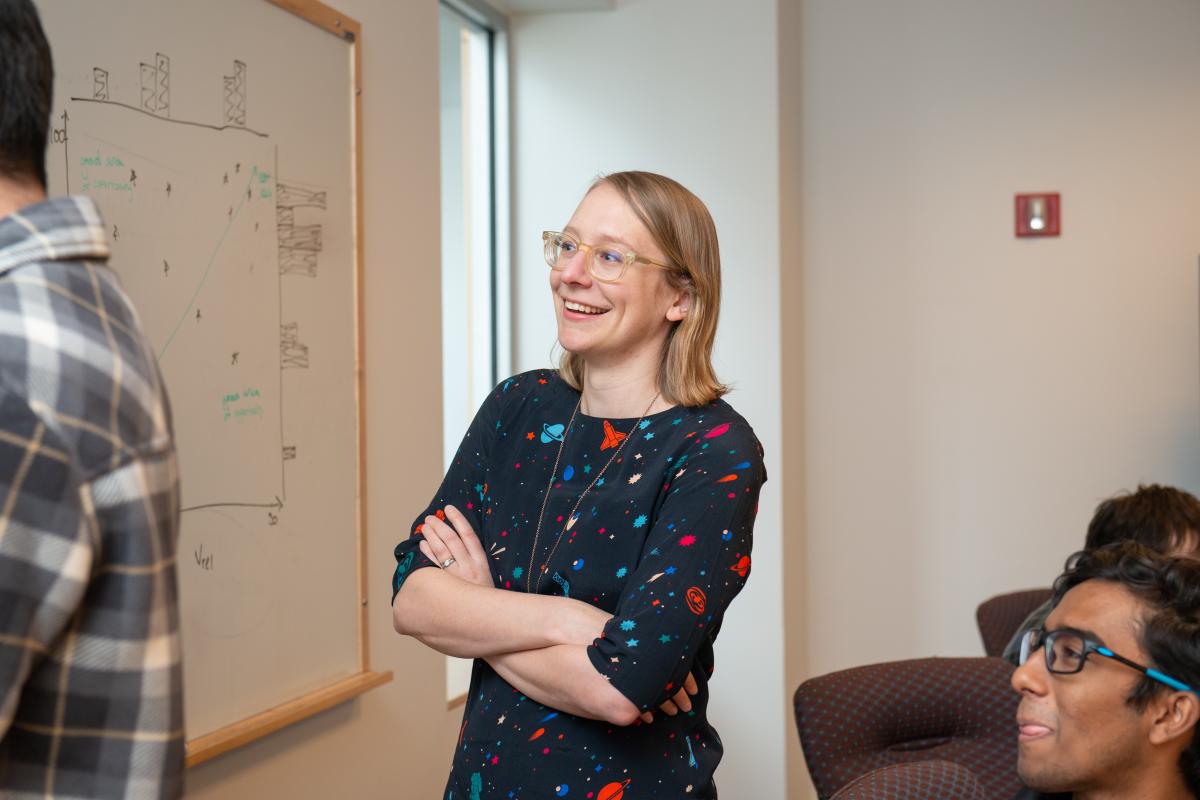
Associate Professor Carrie Nugent collaborates with the MGHPCC to use supercomputers for her own and student research.
Read this story at olin.edu
Carrie Nugent, associate professor of computational physics and planetary science, is leveraging her partnership with the Massachusetts Green High Performance Computing Center (MGHPCC) to help give Olin students access to powerful computing resources.
A joint venture between Boston University, Harvard, MIT, Northeastern, and the University of Massachusetts system, the MGHPCC is a high-performance computing facility serving more than 20,000 faculty and student researchers and educators. Resources housed at the MGHPCC enable users to perform millions of virtual experiments each month, advancing understanding in societally important areas such as climate, energy, medicine, and more.
“As large computers became easier and less expensive to use in the early 2000s, they became more important to the research enterprise for everyone from physicists and chemists to social scientists,” says John Goodhue, executive director of the MGHPCC. “To better leverage their financial resources, some of the state’s largest research universities formed a consortium and built a data center that could serve all their needs. Today, smaller institutions like Olin are also able to use these resources to help advance scholarly knowledge across Massachusetts.”
Nugent first began using a computer system at the MGHPCC operated by Boston University to further her research into asteroid detection.
“An asteroid impact is the only natural disaster we have the technology to prevent, but we can only do that if we know one is coming,” says Nugent. “I’m interested in combing through archived images of the sky to find asteroids and comets, but there’s just too much data for my laptop to handle. What would take days on my laptop just takes a couple hours at the MGHPCC. It’s a fantastic resource.”
Now, Nugent has also begun using the data center’s computing and storage resources in “Scientific Computing,” an upper-level computing elective where students can practice building complex computer models and comparing their results to real-world outcomes.
“In the course, students take on real-world models to learn effective computing skills,” says Nugent. “The first two projects are on simulating how ants form trails and how water molecules migrate on the surface of the moon, and students get to pick their third project. The supercomputing resources at the MGHPCC are ideal for some of these projects because it is relatively easy to use and can dramatically speed up students’ work.”
Building off a recent scientific paper they had read, Alex Butler ’23 and Daeyoung Kim ’25 chose to implement a novel metaheuristic search algorithm for image reconstruction for their final project. Nugent connected them to the MGHPCC to streamline their work.
“Image reconstruction is very resource heavy, and we knew we couldn’t run the algorithm on our own computers because of the amount of time it would take,” says Kim, an Engineering: Computing major. “Carrie had mentioned the supercomputing cluster, and it was invaluable to be able to use this resource that was always available; we just sent the simulation over the internet and let it run in the background.”
“When I heard about the MGHPCC, I made it a goal to find a way to use it as a resource,” says Butler, who graduated in December with his degree in electrical and computer engineering. “Having a computer that is dedicated to crunching numbers is a powerful tool to have at our disposal as students, and Olin is really lucky to be able to leverage this kind of connection through Carrie because of her own research.”
Nugent hopes that this partnership can expand to more Olin classes and research groups. The Boston University computer system at MGHPCC is also used by Chris Lee, associate dean and professor of mechanical engineering, and Paul Ruvolo, associate professor of computer science. Incoming Olin faculty Victoria Preston has previously used the MGHPCC and made the introduction that led to the current collaboration.
As the recipient of a 2023 Fulbright U.S. Scholar Award, Nugent is spending spring 2024 at Denmark’s Aalborg University. There, she will co-supervise projects, collaborate with students on a near-Earth asteroid research project, and offer a science communication micro-credential program that will be open to all Aalborg University students, faculty, and staff.
Story image: Carrie Nugent, associate professor of computational physics and planetary science.